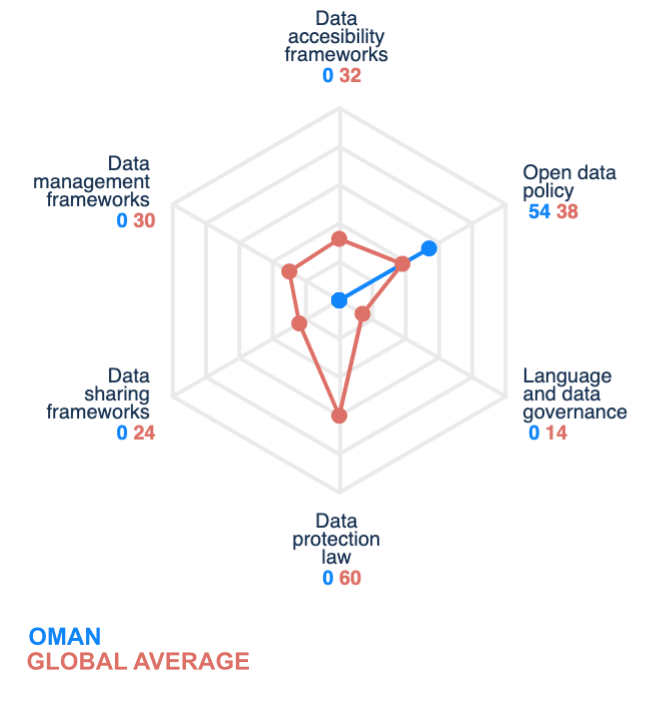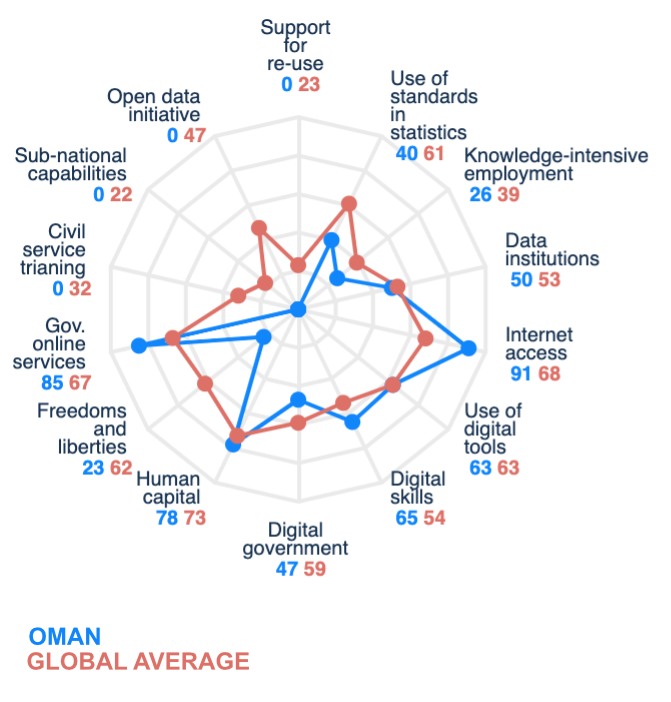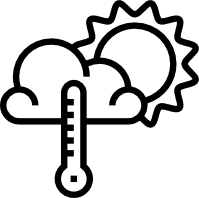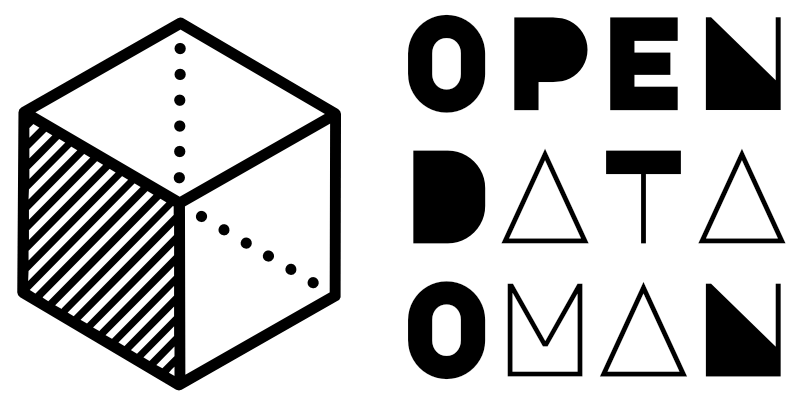The first edition of the Global Data Barometer was launched a few months ago as the new international standard for assessing the extent to which governments around the world effectively publish open data. The Global Data Barometer evaluated 109 countries, and it gave Oman a score of 14%, making Oman the worst-performing GCC country on the barometer and among the lowest 10% tier of all the countries evaluated.
Even though the barometer is explicitly choosing not to give ranks to countries, we can only understand what is realistically possible to achieve by comparing ourselves to our neighbours. We believe that the score Oman achieved is a reflection of the state of open data in the country, and Oman needs to take proactive steps if it desires to take advantage of the opportunities created by open data and be part of the global data revolution.
This post looks at the criteria used by the Global Data Barometer to evaluate Oman and makes some recommendations on how Oman can improve its performance in future editions of the barometer.
The open data movement is an international effort by governments around the world to release the data they already possess in a manner that is technically and legally open, with the objective of maximising the ability of the private sector, civil society, academia, and the government itself to benefit from this data. The availability of government open data is especially important in countries such as Oman where the amount of data (public or private) available is extremely limited to start with, making it difficult for data-driven fourth industrial revolution technologies, such as artificial intelligence, to take off domestically. The ultimate objective of Oman Vision 2040 is also to lay down the foundations for an empowered knowledge-based society, and making government data available openly for society to benefit from is, without a doubt, an enabler for realising this vision.

The Global Data Barometer is an indicator for assessing the extent to which governments around the world publish open data. It is a new indicator that succeeds the Open Data Barometer (which did not cover Oman). Indicators such as the barometer are useful to governments because they evaluate the performance of governments objectively, they showcase best international practices, and, most importantly, they identify areas that governments can work on to improve their open data initiatives.
For Oman in particular, performing well on the Global Data Barometer can also potentially help achieve the targets set by Oman Vision 2040 indicators. Even though the barometer is not explicitly identified as an indicator targetted by the vision, it is reasonable to expect that it will be used as a secondary source in some indicators that are targeted by the vision, such as the Rule of Law Index, which currently references the Global Open Data Index as a secondary variable, and is likely to be updated in future editions to use the Global Data Barometer instead. Accordingly, Oman’s score on the barometer is likely to impact its score on other indicators in the future.
GCC Countries on the Global Data Barometer
Note: Kuwait was not assessed by the first edition of the Global Data Barometer.
The Global Data Barometer assessed all GCC countries except for Kuwait. Saudi scored the highest at 29% and Oman scored the lowest at 14%. The average score on the barometer is 34.38% and no country scored higher than 70%. The Middle East region in general scored the lowest among all other regions.
Assessment Criteria
The Global Data Barometer assessed the state of open data in Oman from four different dimensions: governance of data, capability of data publishers and users, availability of selected key datasets, and evidence of use and impact of open data.
Governance
The Global Data Barometer starts its analysis by examining the legal and policy framework that govern various aspects of the use of data in different countries. A key aspect of these frameworks is obviously the existence of an open data policy issued to govern the release of open data by the government. However, the barometer also looks at broader legal and policy frameworks that can facilitate the ability of members of society to utilise data and ensure the protection of their rights. Accordingly, the barometer also looks at whether the country has a data protection law, a framework for sharing data between government entities and between the government and third parties, a framework for data management that ensures consistent management and publication of government data in general, a framework for ensuring that data is available in the official language of the country, and a framework for ensuring that data is accessible to disabled persons.
With the exception of the existence of an open data policy, Oman scored zero in all other categories, including in the area of data protection, since the Omani Personal Data Protection Law came out after the assessment period of the barometer.

The legal policies and frameworks that the barometer aims to identify are all important to have, and there is no justification for their non-existence in Oman. The government is required to issue a data management and sharing framework in accordance with article 6 of the Statistics and Information Law (confusingly referred to as a strategy), and it is not clear why this framework has not been issued until now. Furthermore, Oman has also ratified the UN Convention on the Rights of Persons with Disabilities, and should have laws and policies in place to ensure that data published by the government is accessible to them (There appears to be an old ITA e-accessibility policy, but the status and scope of this policy is unclear).
Recommendation:
Oman should consider issuing legal or policy instruments for government data sharing, government data management, and accessibility of data to the disabled.
Capabilities

The capability dimension of the barometer examines the extent to which a country has the appropriate resources for utilising data for the public good. Such resources range from internet infrastructure and digital skills, to institutional support and public freedoms. The majority of the scores under this dimension were obtained through secondary resources such as the World Bank Digital Government Systems and Services (DGSS) dataset, the UN E-Government Survey, the Global Innovation Index, the Global Competitiveness Report, and the Freedom in the World Report.
In addition to these secondary resources, the Global Data Barometer assessed on its own the existence of an open data initiative, the existence of government support for the re-use of open data, the existence of civil service training in regard to data, along with sub-national capabilities.
As can be seen from the chart on the side, Oman essentially scored zero in almost all the aspects evaluated directly by the Global Data Barometer, indicating that there is no evidence of an active national open data initiative, no evidence that the Omani government supports users of open data, no evidence of the availability of data training for civil servants, and no evidence of sub-nationality capabilities in regard to open data.
The researcher who reviewed Oman was aware of the existence of a National Open Data Initiative in Oman since 2013, but also noted that this initiative does not appear to have any activity since the year 2019.
Last year, the MTCIT announced a National Open Data Programme for the years 2021 to 2025, but as indicated by the barometer, there is no evidence that Oman’s national open data initiative is active at all. This national programme includes capacity building, public engagement, and international cooperation activities, all of which would have satisfied the requirements of the barometer had this programme been implemented.
Recommendation:
Oman needs to activate its national open data program, provide periodic capacity building in open data, and demonstrate its support for civil society’s use of open data through competitions and hackathons.
Availability
The availability dimension of the barometer examines the extent to which 19 selected key datasets are available. For each dataset, the score is based on the extent to which the data exists, is available online, up to date, properly structured, and openly licensed among other dataset-specific requirements. The 19 datasets that the barometer evaluates are grouped under the following seven categories:

Climate

Company

Health & COVID-19

Land
The climate category covers data on emissions, biodiversity (endangered species and ecosystems), and climate vulnerability (including data on urban water quality and coastal protection programmes). Even though NCSI publishes some environmental data including emissions, the barometer only found data published by a private company. This dataset is extremely important to Oman and should be one that can, in theory at least, be supplied by the government.
The company category covers data relating to beneficial ownership of companies and the actual company register. The concept of beneficial ownership is not recognised by the Omani company law and therefore there is no basis for its collection by the government and no such dataset exists. However, the company register does exist in Oman as a digital database and can in theory have the data published as open data. However, due to the operation model of InvestEasy (the service through which the company register is made available online), it is unlikely that the government will release the complete company register dataset for free.
The health category covers data on vital statistics, real-time health care system capacity, and COVID-19 vaccination. Vital statical data is published on NCSI data portal, but the other two are not made public by the Omani government. It is unknown if the government has real-time data on health care system capacity, but certainly has COVID-19 vaccination data, which it has intentionally chosen not to publish.
The land category covers data on land tenure (ownership) and existing land use. The government certainly has these datasets, but due to the Omani cultural context and the sensitivity around land ownership, it is unlikely that the government will make land ownership data public anytime soon. In regard to land use in general, the NCSI publishes geospatial data of this kind as part of its Oman National Spatial Data Infrastructure Project. However, the barometer researcher was unable to use the website to verify the existence of the data.

Public Finance

Public Procurement

Political Integrity
The public finance category covers the dataset on the government budget and spending. This is one of the few areas in which Oman excels as the data is published openly in Excel format on the website of the Ministry of Finance, on NCSI’s data portal, and also as an attachment to the royal decree approving the budget on the website of the MJLA.
The public procurement category covers the dataset on government tenders. The Omani government transitioned to an e-tendering system a while ago and has integrated open data as part of this new system, and the barometer has identified that it is available through the website of the Tender Board.
The political integrity category covers a variety of datasets relating to political financing, asset declaration of public officials, lobbying, and right to information performance. The majority of the topics under this category are not governed by Omani law and therefore such datasets do not exist, with the exception of the asset declaration of Omani public officials, which is collected by the State Audit Institute, but is extremely unlikely to be made available to the public any time soon due to the Omani cultural and political context.
Oman’s unimpressive performance in the availability dimension can be understood in regard to datasets that are difficult to publish due to the cultural and political Omani context, but the lack of the availability of datasets relating to the environment and health cannot. Publishing these datasets does not require a legal reform or a cultural shift, and can be easily published if the government organises its efforts and focuses on easy-to-publish datasets that already exist.
Recommendation:
Oman should consider focusing on releasing environmental data, health and COVID-19 data, public finance data, and public procurement data as open data. All of which are relatively non-controversial and should be available within government entities in machine-readable formats.
Use and Impact
The final dimension the barometer examined is the use and impact dimension, which is an aspect that is universally regarded as the most challenging to measure and evaluate. Instead of looking at impact in general, the barometer examined the extent there is evidence of the use of open data in regard to the following four cases only:
- The extent to which there is evidence that open data has been used to improve government procurement practice.
- The extent to which there is evidence that open data has been used to identify, export, or highlight failures of government, with an emphasis on political integrity data.
- The extent to which there is evidence that open data has been used to influence policy in the interest of equitable and inclusive land tenure and use.
- The extent to which there is evidence that open data has been used to support corporate due diligence.
Oman essentially scored zero in almost all four areas, which is not unexpected given the country’s maturity level of the open data initiative. It is extremely difficult to track impact, which is in a way an outcome of an elaborate and comprehensive open data initiative supported by a proper governance framework and sufficient resources.
Final Thoughts
Unfortunately, Oman’s performance on the first edition of the Global Data Barometer was disappointing. The fact that the government had a major restructuring two years ago and had a reduction in its workforce resulted in the loss of several open data initiatives— including the impressive open data initiative by the former Ministry of Manpower—and this probably contributed to Oman’s score, especially in regard to the capabilities dimension.
However, this also means that Oman has a lot of room for improving its open data initiative. That being said, the Omani open data movement will only succeed if the government genuinely commits to it by allocating staff and resources to lead the national open data movement, identify open data targets and priorities, and mentor and guide government entities on how to publish their data openly.
To learn more about Oman’s performance on the Global Data Barometer, you can download the full report here, you can view country-specific dashboards here and download a CSV file with Oman’s score details here.
